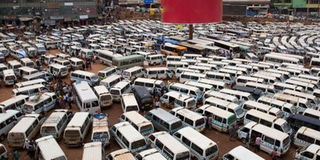Taxi drivers hold back plan to develop old park

Under contention. An overview of the congested Old Taxi Park in Kampala. KCCA says the redevelopment of the park was supposed to begin last month. FILE PHOTO
What you need to know:
Reservations. Taxi operators want private owners of land surrounding the park to be compensated before the facility is developed lest they are kicked out.
Kampala. Kampala Capital City Authority is considering diverting funds meant for the redevelopment of the Old Taxi Park to other critical areas, citing frustration.
The authority received a Shs4.3b grant from the Netherlands government to do feasibility studies to redevelop the taxi park. But KCCA would fund the construction works at a cost of Shs6b.
“We shall have no option but to put that money to other critical areas because taxi operators are frustrating our effort to decongest the city. Apparently, the contractor (Stirling), who was supposed to work on the facility is now stuck,” Mr Peter Kaujju, KCCA spokesperson, said in an interview.
Although the park belongs to the authority, there are surrounding private plots which might be affected by the redevelopment.
Daily Monitor has established that KCCA engaged owners of the plots to surrender the land and wait for compensation.
However, taxi operators under their Kampala Operational Taxi Stages Association (Kotsa) are opposed to the redevelopment deal.
They argue that the two acres, which they currently occupy, might be given out to an investor in the guise of redeveloping the facility.
They have since asked KCCA for paperwork showing how owners of the private plots agreed to surrender their land.
Mr Kaujju said the contentious plots belong to Kay and Ham, Kabale Distributors, Aponye, Shumuk Industries, City Oils, Kagodo farmers, Abamwe Transporters, Lukyamuzi Investors, DKS Uganda, Giant Eagle Mobile Phones, and Contractors and Transporters Services.
Initially, the park covered five acres of land but KCCA says part of it was allegedly sold by its predecessor Kampala City Council, leaving only two acres.
Mr Kaujju said they need more than the two acres if they are to set up a better parking facility.
He said although the plot owners agreed to surrender the land to KCCA, taxi operators have blocked the project, fearing that the existing land on which they currently occupy could be given to an investor.
“They claim that the land will be given to an investor but this isn’t true because we have engaged owners of the surrounding plots,” he said.
Mr Kaujju said the redevelopment of the park was supposed to begin last month with laying the entire carpet area to ease mobility.
He said the phase was supposed to take six months but would subsequently be followed by other phases.
Mr Yasiin Ssematimba, the Kotsa chairperson, told Daily Monitor that part of the park land was previously leased out under unclear circumstances hence KCCA must first compensate the current owners of private plots to avoid wrangles.
“We cannot allow that arrangement because we are not sure whether the owners of those plots won’t turn against us in case compensation delays because government promises take long to mature. We can’t therefore surrender that park for redevelopment until KCCA steers clear of any controversies surrounding it,” he said.
Mr Ssematimba said taxi operators are already grappling with parking challenges, adding that the problem could escalate if they lose the facility.
In store
According to the redevelopment plan, the infrastructure will have an improved land use consisting of transit terminals, commercial spaces and multi-level parking facilities.
The park will also have amenities such as public toilets, shopping arcades, green space rest areas and raised walkways for pedestrians.
“The construction works will also involve excavations to lay sewer lines, drainage networks and engineering works on surfacing the carpet and thereafter other supplementary ground works including the park,” Mr Kaujju said.
Taxi operators were supposed to be relocated to different city parks and bus terminals to pave way for construction, but Mr Ssematimba said KCCA technocrats did not explain the plan well.
It is estimated that at least 200,000 passengers commute daily through the park to connect to different destinations in other metropolitan areas of Wakiso, Mpigi and Mukono districts.
The facility is currently clogged with potholes and congestion, causing a traffic gridlock.
While touring the city last year, taxi operators told President Museveni that they risked losing the park since it is surrounded by some privately-owned plots.
The President, flanked by several government officials, including KCCA technocrats, pledged to look into the matter.
Mr Museveni stressed that all public working places such as markets and taxi parks should be managed by people who operate there on behalf of government.
However, taxi operators told Daily Monitor that the President was yet to fulfil his pledge.
In a telephone interview yesterday, Mr Hillary Musoke, the head of special duties at State House, acknowledged that Mr Museveni pledged to support taxi operators, but added that a committee was set up to study the matter and report to Cabinet.
Mr Musoke said the committee would also look into demands made by vendors in city markets and arcade traders, among other informal businesses.
“The President’s stand is very clear on city public working places and he wants all these places to be managed by the people who operate there because there have been previous incidences where ordinary vendors have been kicked from markets by the rich,” he said.
However, Mr Musoke did not offer details on when the committee would submit their findings though he said the redevelopment of the taxi park was one of them.
In 2016, KCCA banned more than 50 illegal taxi stages from the city to ease traffic flow. However, there are still illegal stages coupled with illegal boda boda stages.
However, taxi operators accuse government of failing to plan for them, arguing that they have been paying a lot of revenue which could be used to construct spacious parking terminals.
“It is not our own making to operate on illegal stages. We have been crying to government to build for us parking terminals in vain. As a result, we find ourselves roaming around streets because the available taxi parks have inadequate space,” Mr Moses Ssenfuka, a taxi operator, says. There are currently three public taxi parks in the city. These are Old, New and Usafi parks. The rest across the five city divisions are privately owned.
Taxi operators argue that private taxi parks have stringent operational regulations such as heavy parking fees.
KCCA puts the number of taxis at about 14,000. But the three it owns can only accommodate less than 1,000 taxis.
The private taxi parks in Kisenyi, Namayiba and Namirembe Road have inadequate parking spaces too.
City parking crisis
It isn’t only taxi operators that are grappling with parking spaces but also private car owners.
Last year, Mr Jacob Byamukama, KCCA’s director in charge of roads and transport, said there are about 45,000 parking spaces in the Central Division.
Mr Byamukama also said there are about 25,000 illegal street parking spaces in the city.
Even then, the available parking spaces are small compared to the number of cars.
City arcades are not spared either, which makes it troublesome for tenants who own cars. Most of the city arcades Daily Monitor visited in down town Kampala have less than 100 parking slots.
Some car owners and managers of parking lots said there are times when most of the parking lots are full thus forcing them to drive out of the city to look for parking.
POOR PLANNING
Ms Amanda Ngabirano, a planning expert and lecturer of Urban Planning at Makerere University, blames the confusion of Kampala’s parking spaces on poor planning, saying it continues to paint a bleak picture on the city’s status, if not streamlined.
Although parking spaces are a component of the transport system, Ms Ngabirano says, Kampala’s lacks policies on transport and parking which would help to mitigate the current challenges.
“People should be driving in Kampala just to drop and pick but not to park for hours on streets. But where are the designated parking spaces? For instance, parking complexes have to be built on major roads such as Entebbe, Jinja, Bombo and Hoima, among others, where people going to town for work can park their cars and pick them in the evening,” she says.
Ms Ngabirano says more parking spaces in the city can only be realised only if traffic flow is controlled in the city, adding that parking isn’t supposed to be on the road but rather in complexes which must be systematically planned.
She acknowledges the fact that inadequate parking is a global challenge but she says such cities have planned for transport in line with the different developments such as housing units, schools, hospitals, shopping malls and industries, among others.




